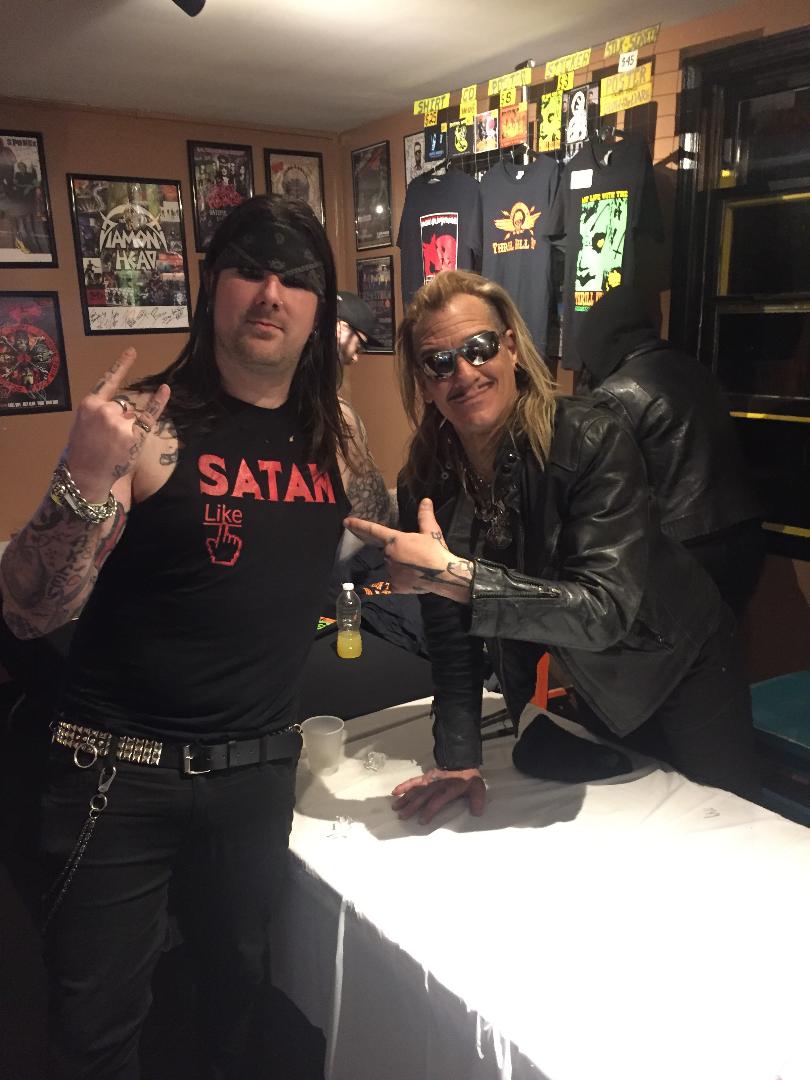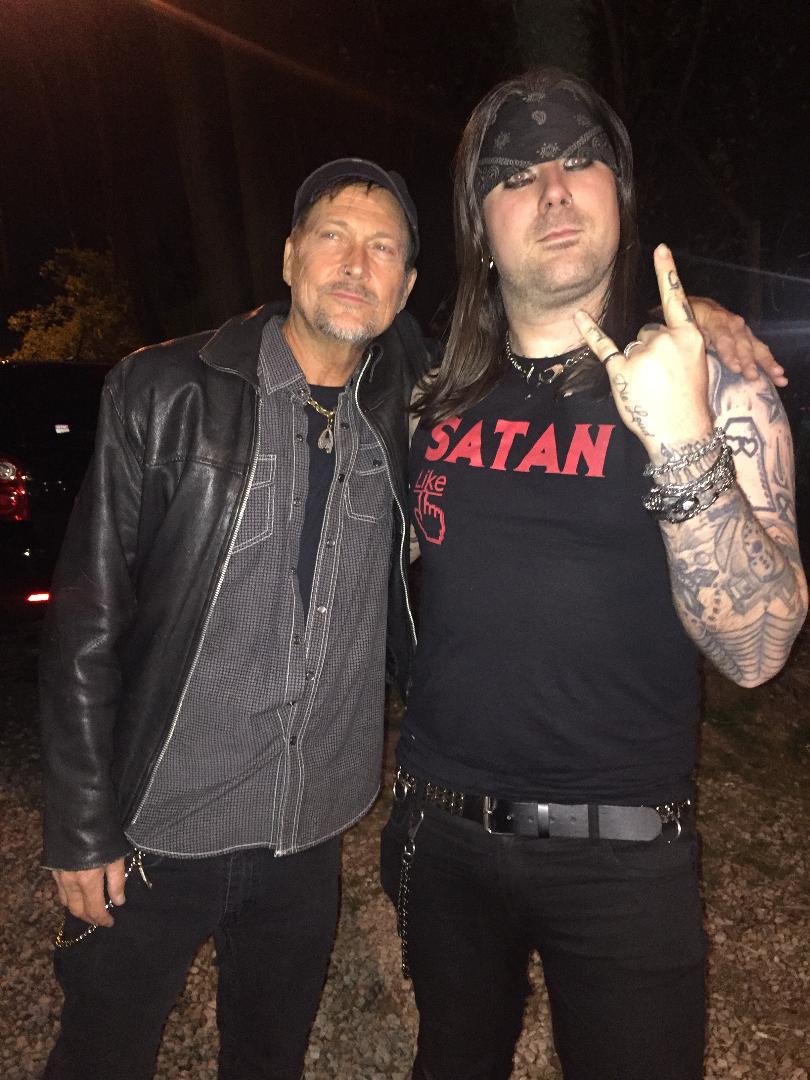My Life With The Thrill Kill Kult's Groovie Mann and Buzz McCoy
By Jay Oakley
I'm sitting here with Buzz McCoy and Groovie Mann from My Life with the Thrill Kill Kult. Guys, how was your trip in?
Groovie Mann: It was pretty good, not much traffic today. We were lucky, it was amazing.
Buzz McCoy: Good. No, we were coming down from New Haven and we flew right over the George Washington Bridge. There was no traffic but it was kind of weird, we were like, "Were is everybody?"
Your latest album (Spooky Tricks) came out in 2014 so it's not super new but it's your most recent work. Have you every had any issues with adding new songs into your set and having them fit properly?
Buzz: We work it in. We usually have a section of the set that we play the new material in.
Groovie: Or stuff that's similar to what we've done set near it. Even a song we've already done but made it new.
Buzz: And, as you'll find out tonight there's a couple of songs we do with an older song that leads right into a newer song. It's kind of a medley so we, kind of, mix it up and keep it different. We do new mixes of old songs to keep them fresh. We put different beats behind them.
Groovie: We add some new sparkles into it. Different sounds and stuff.
From your last album (Spooky Tricks, 2014) to the one before (Death Threat, 2009) you had about a five year between albums. Do you have any current music that you're working on for something new?
Groovie and Buzz: We're actually just starting.
Buzz: We're working on a new album because the game plan is next year is our 30th anniversary. So, basically, we want to come out with a new album, a big tour and just milk that 30th anniversary thing [Laughs] have some fun and then maybe take ten years off. [Laughs]
You have mentioned your 30th anniversary and I always love to talk history. It's documented that you originally started with a film project that spawned into the creation of Thrill Kill Kult as a musical band. Would you talk a little bit about exactly how that did work and what your plans were for the film and why it changed.
Buzz: Well, I had just recently moved to Chicago and I ended up living right across the street from him (Groovie.) So, basically, we just hung out all day and watched movies. He's a big movie buff and he showed me all these foreign movies I'd never seen before and stuff and we were like, "We could do a movie. That'd be so much fun to do some kind of movie." So, we didn't really have to many ideas.
Groovie: No, we were just, sort of, playing and experimenting around with ideas. We weren't film people.
Buzz: We borrowed an old video camera and filmed some blood going down a drain and lighting fires in his basement, [Groovie Laughs] things like that and filming it. But, basically we wee working on music more. [Groovie: Right.] So the film idea, kind of, dissolved once Wax Trax! (Records) heard our music and they said they wanted to put us in the studio. We were like, "Really?!" and they were like, Yeah, we'll put you in and see what happens." and the rest is history. We rounded up some friends that we knew from the bar and through a band together.
Groovie: All the girls, they weren't dancers, they were bartenders or chicks that we liked to hang out with that were crazy. Then their personas gelled into their characters and they became who they are.
Buzz: Everybody got a nickname and that was their character.
After you got picked up by Wax Trax! and started putting out albums, your music got really popular and picked up a lot for movies. Not only with soundtracks but you also have a very famous appearance in The Crow. How was it being filmed performing in a movie as opposed to having one of your normal shows shot?
Buzz: It wasn't much different.
Groovie: We, kind of, learned about it by doing Cool World, previous to The Crow. Being in Hollywood on the Paramount sound set. Paramount Studios with the green screens and all the cameras and the monitors.
Buzz: Being in The Crow, though, it was set up as a club so it was just like playing a club, basically.
Groovie: It was comforting. On a high stage.
Buzz: We had an audience. We had a big, huge stage. It was just like playing a show except we played the song about ten thousand times. We'd do like half a verse and then, "Cut!" and we'd sit around for two hours and then, "Ok, do it again!" and then do another half a song and then wait for three hours.
I was going to ask if it was like that.
Groovie: Yeah.
Buzz: Plus, we did it in a cement factory and it was like minus twenty degrees outside. It was an abandoned cement factory and it was really, I would say, it was about twenty degrees in there because it was cold and damp because it was so cold outside.
Groovie: You could see your breathe. Dripping water running down the walls in some spots and machinery.
Buzz: We were, literally, freezing with leather and everything on. They had one room that had a heater in it that was for us but all the kids in the audience that were shirtless and stuff were freezing. They were shivering in blankets for hours and then they'd get up and dance and then they'd go lay down and shiver in blankets and we did it for two days. It was a two day shoot just for the thirty seconds they used.
Getting back on the topic of your 30th anniversary. When you look back at Thrill Kill Kult now as opposed to back when you started it, what does the band as a whole mean to you?
Buzz: It's been our life for thirty years.
Groovie: It just dawns on you that, "This is my life." and my baby / band is going to be thirty now and it's like a thing. It's like your child, your work or a doggie, a K-9 buddy. [Laughs]
Do you ever look back on whether or not you may or may not have changed anything or was it all just going with the flow and it's all experiences?
Groovie: I think that it's with the flow. That's why I think it's still going because it's still flowing. We never hit a wall because we never closed any doors to what we were doing. We just let it happen.
Buzz: We never put any limits on our music, style because we like to change up or style and explore. We're not just one sound, one style.
Groovie: And, we were experimenting unintentionally, it wasn't a focused thing. We would try this or try that or maybe these lyrics work on a different track instead of the track you put them on. There's no barriers.
Buzz: It's like cooking. You put all these ingredients in a pot and mix them up and see what comes out.
Groovie: Exactly. [Laughs]
Groovie, I wanted to ask you about Al Jourgensen. Some people may know, some people may not know, you did work (Special Affect) with Al Jourgensen before he was in Ministry. How was Al then as opposed to what we know about Al now?
Groovie: Al always had his shtick. Before he got, sort of, famous he was just some guy that moved from Denver. We were looking for a guitarist, we auditioned him. He had a guitarist ego but he was cool, ya know. We thought he was, kind of, a hippie because at the end of the 70s into the 80s because he had long hair and it was when the dark wave began for us after punk and everything. So, he was playing Led Zeppelin licks with his foot up on the amp and me and my bass player were sitting there, smoking cigarettes and I was like, "He's kind of a hippie." [Laughs] I'll can't forget that.
Buzz: He was your second guitar player.
Groovie: Yeah, he was our second guitarist too. We had a really great guy and I can't remember what his story was, why he left. His girlfriend or something. He (Al) was just a replacement guitarist and, I don't know, he had an ego, like I said, like a guitarist ego, like a singer ego, whatever. But, things have changed so much with our relationship. He's done a few things that have, sort of, made me mad. He took or first record and sold it to another record company. We had a band called Special Affect, Harry Rushakoff from Concrete Blonde, he went off to that band and Al became Ministry but the core of that, it was the last thing he did that, sort of, it made me mad that he took that project and sold it to Cleopatra.
Buzz: He included it in his catalog. He didn't write any of it. So, that's why it's called Al Jourgensen's Special Affect but he's just the guitarist on it. He didn't write any of it.
Groovie: Yeah, me and the bass player wrote all the songs so that, kind of, hurt my feelings. It was blatantly, "Hey, I'm gonna do what I want to do. I don't care." But, when you're desperate for money, I don't know.
Yeah, I don't know if you've ever seen his film, Fix but it's a crazy thing. That was a weird thing to sit through.
Groovie: I, personally, it embarrassed me for him. Like, he's calling himself a star and he's trying so hard to be wild and crazy that, I think, it mentally got the best of him in the end because he always had to try to be, "I know I can do this, I can do that to get attention." Rather then to be a natural at being crazy it seemed always so forced. He's done some things that are descent and he's done well in the business and he was somebody who knew the framework for touring and shit. More so then most people did but he only learned that from everybody else, his peers. But, he always kept himself segregated that he was better then most. We would go into the studio at three in the morning because he had booked it out constantly and he had that right because he had Sire (Records) behind him.
Buzz: We always had somewhere to go after the bars closed, we'd just go hang out in the studio.
Groovie: Yeah, we would just go down there.
Buzz: Because, Al was just there partying. They weren't even recording half the time.
Groovie: Paul (Barker) was doing all the work and Chris (Connelly.) Paul is all those albums, all those good records. Al was a slave driver and in the end, which also bothered me, anybody that he used or worked with was shit in his book (Ministry: The Lost Gospels According to Al Jourgensen.) Like, Paul was stuffy and Chris was a wimp. These were the people that brought him up in his world and he just denied them and I also found that kind of hurtful.
And, to bring it back around to TKK because that is the reason why we're here. Did you always have a pretty solid plan about wanting to experiment? Because, you fit into so many categories, so were you always open to basically, every sound is our flavor?
Groovie: Pretty much, that is how we've always been.
Buzz: Yeah, a little bit of everything. Don't limit yourself.
Groovie: Definitely, I never really understood the term artist when someone was a musician but that's why it's what it is. Like he said, like a chef is. You're taking all these elements and you're putting them together. A dash of this, a dash of that, a dash of jazz, a dash of rock and it's like, "Hey, let's see what this sounds like together." and it's just taking those chances.
Buzz: It's like, an artist is the chef and a musician is the sous chef. [Laughs]
Groovie: It's just like a painting. We say it's like a puzzle, too. There's this puzzle and the pieces are all over the place and we're picking it up a piece at a time and it's fitting together and then the puzzle's done and there's the album.
Guys, thank you so much for taking the time to talk.
Groovie and Buzz: Thank you. No problem, sure.



